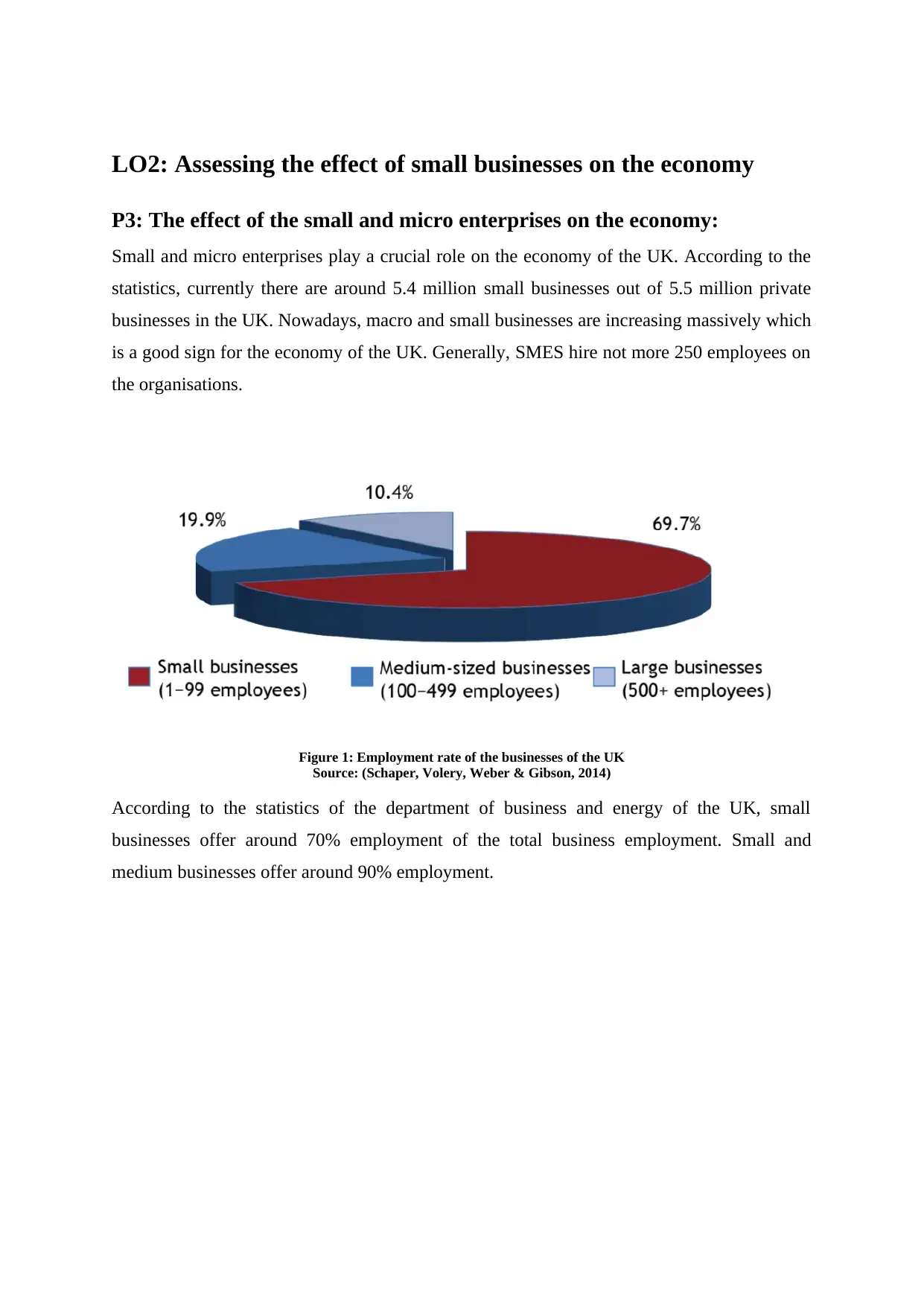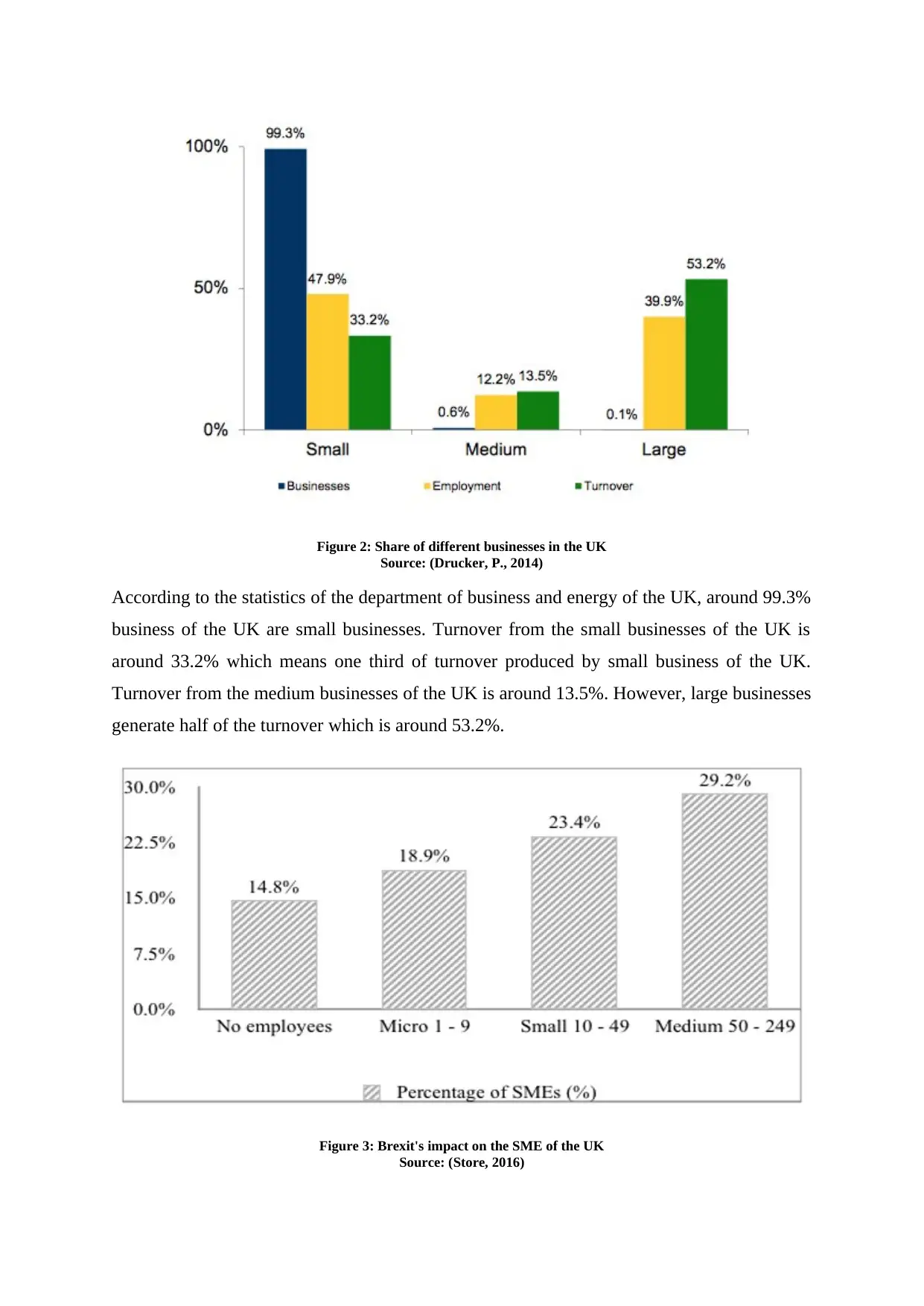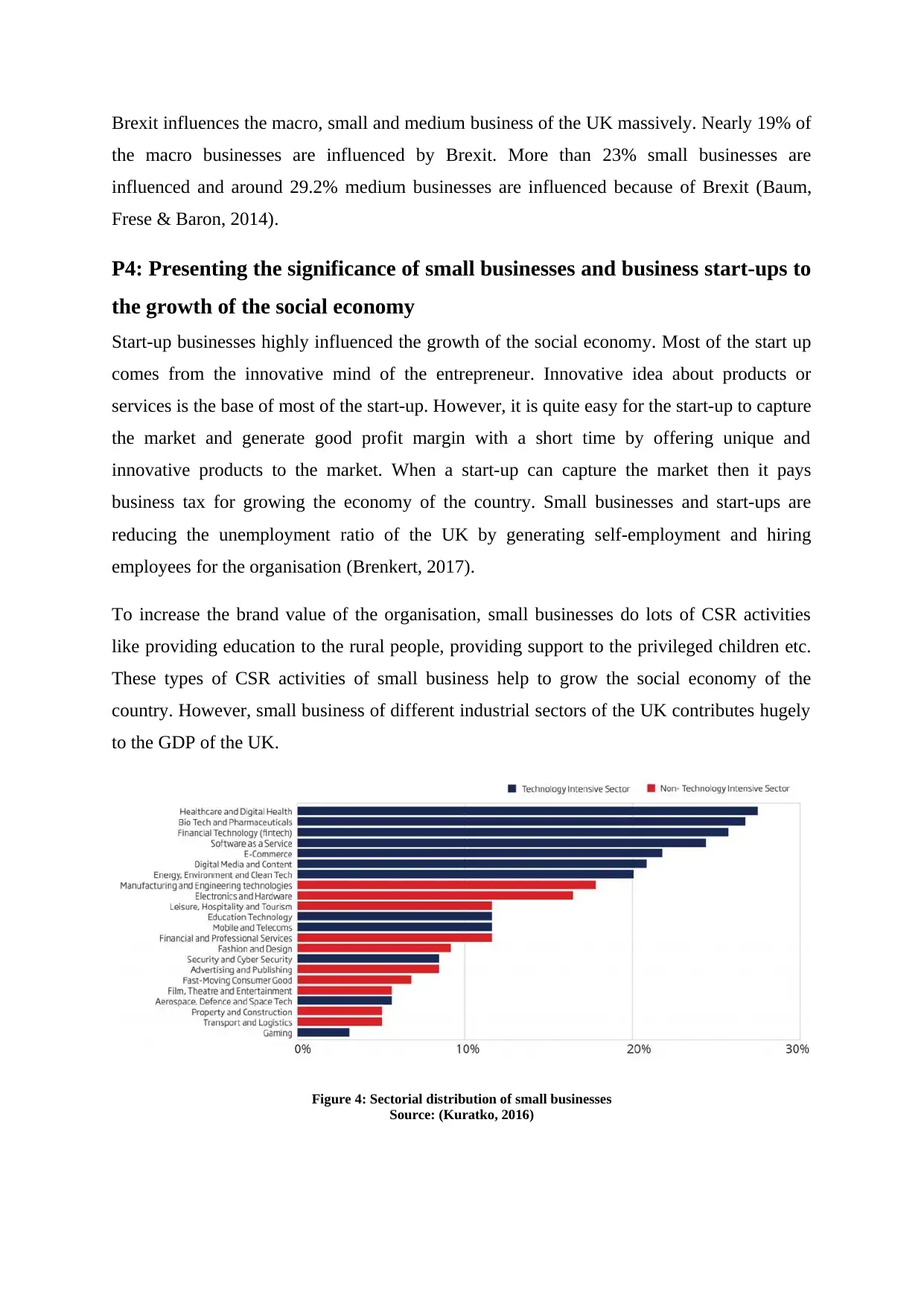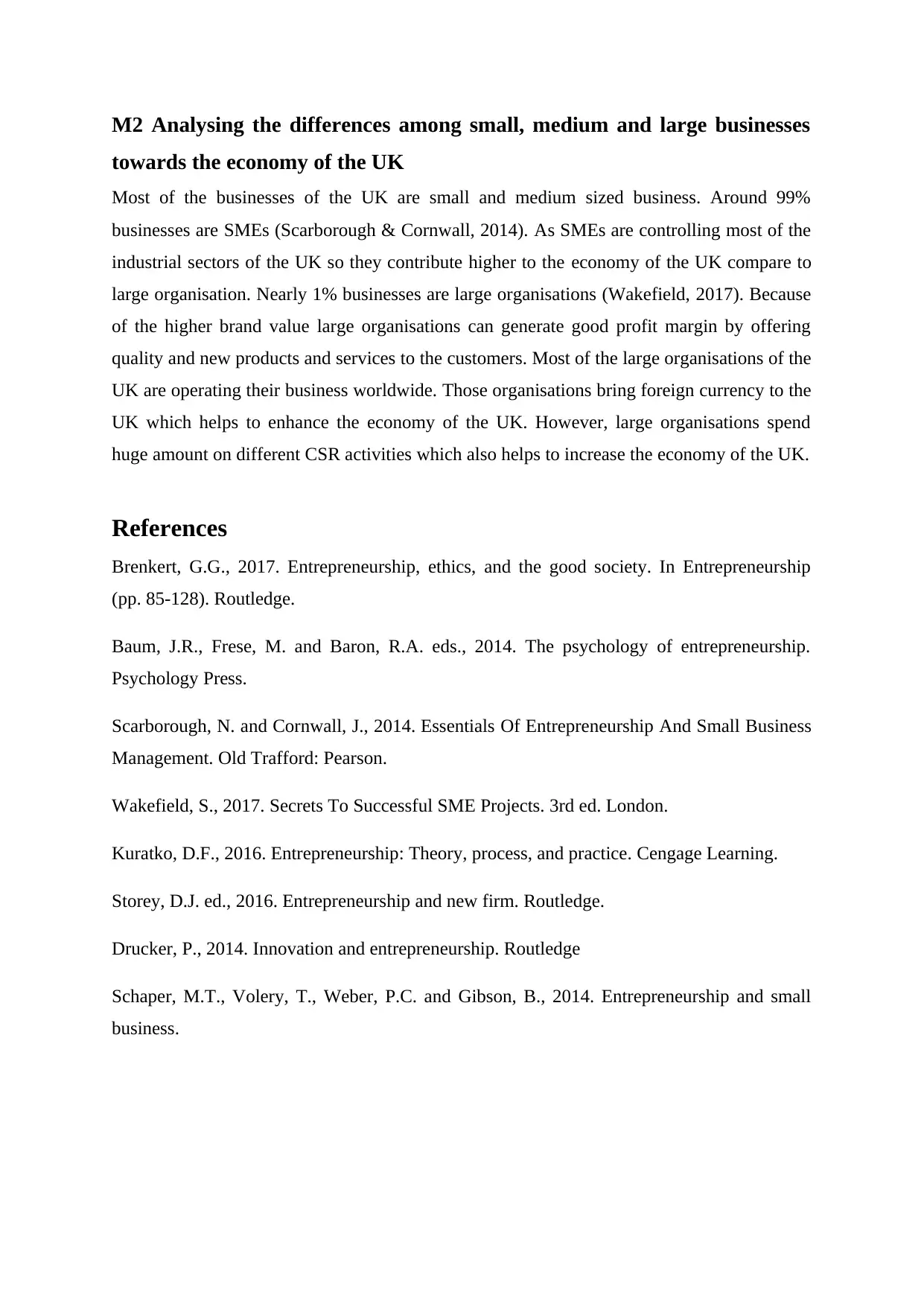Assessing Small Businesses' Effect on the UK Economy (LO2)
VerifiedAdded on 2021/11/16
|4
|875
|483
Report
AI Summary
This report assesses the effect of small businesses on the UK economy, highlighting their crucial role in job creation, GDP contribution, and social economy growth. It provides statistical data on the prevalence of SMEs in the UK, their turnover compared to medium and large businesses, and the impact of Brexit on these enterprises. The report also analyzes the significance of start-up businesses and their innovative contributions to the social economy through CSR activities and employment generation. Furthermore, it examines the differences between small, medium, and large businesses in their contributions to the UK economy, considering factors such as brand value, foreign currency earnings, and CSR spending. Desklib offers similar reports and solved assignments for students.

LO2: Assessing the effect of small businesses on the economy
P3: The effect of the small and micro enterprises on the economy:
Small and micro enterprises play a crucial role on the economy of the UK. According to the
statistics, currently there are around 5.4 million small businesses out of 5.5 million private
businesses in the UK. Nowadays, macro and small businesses are increasing massively which
is a good sign for the economy of the UK. Generally, SMES hire not more 250 employees on
the organisations.
Figure 1: Employment rate of the businesses of the UK
Source: (Schaper, Volery, Weber & Gibson, 2014)
According to the statistics of the department of business and energy of the UK, small
businesses offer around 70% employment of the total business employment. Small and
medium businesses offer around 90% employment.
P3: The effect of the small and micro enterprises on the economy:
Small and micro enterprises play a crucial role on the economy of the UK. According to the
statistics, currently there are around 5.4 million small businesses out of 5.5 million private
businesses in the UK. Nowadays, macro and small businesses are increasing massively which
is a good sign for the economy of the UK. Generally, SMES hire not more 250 employees on
the organisations.
Figure 1: Employment rate of the businesses of the UK
Source: (Schaper, Volery, Weber & Gibson, 2014)
According to the statistics of the department of business and energy of the UK, small
businesses offer around 70% employment of the total business employment. Small and
medium businesses offer around 90% employment.
Paraphrase This Document
Need a fresh take? Get an instant paraphrase of this document with our AI Paraphraser

Figure 2: Share of different businesses in the UK
Source: (Drucker, P., 2014)
According to the statistics of the department of business and energy of the UK, around 99.3%
business of the UK are small businesses. Turnover from the small businesses of the UK is
around 33.2% which means one third of turnover produced by small business of the UK.
Turnover from the medium businesses of the UK is around 13.5%. However, large businesses
generate half of the turnover which is around 53.2%.
Figure 3: Brexit's impact on the SME of the UK
Source: (Store, 2016)
Source: (Drucker, P., 2014)
According to the statistics of the department of business and energy of the UK, around 99.3%
business of the UK are small businesses. Turnover from the small businesses of the UK is
around 33.2% which means one third of turnover produced by small business of the UK.
Turnover from the medium businesses of the UK is around 13.5%. However, large businesses
generate half of the turnover which is around 53.2%.
Figure 3: Brexit's impact on the SME of the UK
Source: (Store, 2016)

Brexit influences the macro, small and medium business of the UK massively. Nearly 19% of
the macro businesses are influenced by Brexit. More than 23% small businesses are
influenced and around 29.2% medium businesses are influenced because of Brexit (Baum,
Frese & Baron, 2014).
P4: Presenting the significance of small businesses and business start-ups to
the growth of the social economy
Start-up businesses highly influenced the growth of the social economy. Most of the start up
comes from the innovative mind of the entrepreneur. Innovative idea about products or
services is the base of most of the start-up. However, it is quite easy for the start-up to capture
the market and generate good profit margin with a short time by offering unique and
innovative products to the market. When a start-up can capture the market then it pays
business tax for growing the economy of the country. Small businesses and start-ups are
reducing the unemployment ratio of the UK by generating self-employment and hiring
employees for the organisation (Brenkert, 2017).
To increase the brand value of the organisation, small businesses do lots of CSR activities
like providing education to the rural people, providing support to the privileged children etc.
These types of CSR activities of small business help to grow the social economy of the
country. However, small business of different industrial sectors of the UK contributes hugely
to the GDP of the UK.
Figure 4: Sectorial distribution of small businesses
Source: (Kuratko, 2016)
the macro businesses are influenced by Brexit. More than 23% small businesses are
influenced and around 29.2% medium businesses are influenced because of Brexit (Baum,
Frese & Baron, 2014).
P4: Presenting the significance of small businesses and business start-ups to
the growth of the social economy
Start-up businesses highly influenced the growth of the social economy. Most of the start up
comes from the innovative mind of the entrepreneur. Innovative idea about products or
services is the base of most of the start-up. However, it is quite easy for the start-up to capture
the market and generate good profit margin with a short time by offering unique and
innovative products to the market. When a start-up can capture the market then it pays
business tax for growing the economy of the country. Small businesses and start-ups are
reducing the unemployment ratio of the UK by generating self-employment and hiring
employees for the organisation (Brenkert, 2017).
To increase the brand value of the organisation, small businesses do lots of CSR activities
like providing education to the rural people, providing support to the privileged children etc.
These types of CSR activities of small business help to grow the social economy of the
country. However, small business of different industrial sectors of the UK contributes hugely
to the GDP of the UK.
Figure 4: Sectorial distribution of small businesses
Source: (Kuratko, 2016)
⊘ This is a preview!⊘
Do you want full access?
Subscribe today to unlock all pages.

Trusted by 1+ million students worldwide

M2 Analysing the differences among small, medium and large businesses
towards the economy of the UK
Most of the businesses of the UK are small and medium sized business. Around 99%
businesses are SMEs (Scarborough & Cornwall, 2014). As SMEs are controlling most of the
industrial sectors of the UK so they contribute higher to the economy of the UK compare to
large organisation. Nearly 1% businesses are large organisations (Wakefield, 2017). Because
of the higher brand value large organisations can generate good profit margin by offering
quality and new products and services to the customers. Most of the large organisations of the
UK are operating their business worldwide. Those organisations bring foreign currency to the
UK which helps to enhance the economy of the UK. However, large organisations spend
huge amount on different CSR activities which also helps to increase the economy of the UK.
References
Brenkert, G.G., 2017. Entrepreneurship, ethics, and the good society. In Entrepreneurship
(pp. 85-128). Routledge.
Baum, J.R., Frese, M. and Baron, R.A. eds., 2014. The psychology of entrepreneurship.
Psychology Press.
Scarborough, N. and Cornwall, J., 2014. Essentials Of Entrepreneurship And Small Business
Management. Old Trafford: Pearson.
Wakefield, S., 2017. Secrets To Successful SME Projects. 3rd ed. London.
Kuratko, D.F., 2016. Entrepreneurship: Theory, process, and practice. Cengage Learning.
Storey, D.J. ed., 2016. Entrepreneurship and new firm. Routledge.
Drucker, P., 2014. Innovation and entrepreneurship. Routledge
Schaper, M.T., Volery, T., Weber, P.C. and Gibson, B., 2014. Entrepreneurship and small
business.
towards the economy of the UK
Most of the businesses of the UK are small and medium sized business. Around 99%
businesses are SMEs (Scarborough & Cornwall, 2014). As SMEs are controlling most of the
industrial sectors of the UK so they contribute higher to the economy of the UK compare to
large organisation. Nearly 1% businesses are large organisations (Wakefield, 2017). Because
of the higher brand value large organisations can generate good profit margin by offering
quality and new products and services to the customers. Most of the large organisations of the
UK are operating their business worldwide. Those organisations bring foreign currency to the
UK which helps to enhance the economy of the UK. However, large organisations spend
huge amount on different CSR activities which also helps to increase the economy of the UK.
References
Brenkert, G.G., 2017. Entrepreneurship, ethics, and the good society. In Entrepreneurship
(pp. 85-128). Routledge.
Baum, J.R., Frese, M. and Baron, R.A. eds., 2014. The psychology of entrepreneurship.
Psychology Press.
Scarborough, N. and Cornwall, J., 2014. Essentials Of Entrepreneurship And Small Business
Management. Old Trafford: Pearson.
Wakefield, S., 2017. Secrets To Successful SME Projects. 3rd ed. London.
Kuratko, D.F., 2016. Entrepreneurship: Theory, process, and practice. Cengage Learning.
Storey, D.J. ed., 2016. Entrepreneurship and new firm. Routledge.
Drucker, P., 2014. Innovation and entrepreneurship. Routledge
Schaper, M.T., Volery, T., Weber, P.C. and Gibson, B., 2014. Entrepreneurship and small
business.
1 out of 4
Related Documents
Your All-in-One AI-Powered Toolkit for Academic Success.
+13062052269
info@desklib.com
Available 24*7 on WhatsApp / Email
![[object Object]](/_next/static/media/star-bottom.7253800d.svg)
Unlock your academic potential
Copyright © 2020–2026 A2Z Services. All Rights Reserved. Developed and managed by ZUCOL.



